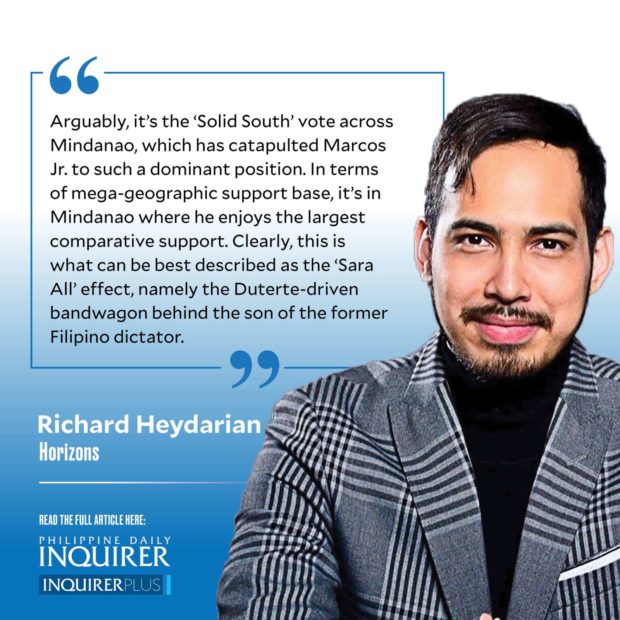‘Solid South’: BBM’s winning formula?
Just two quarters ago, Ferdinand “Bongbong” Marcos Jr. was barely among top three candidates. In Pulse Asia’s June survey, his preference rating stood at only 13 percent, placing third behind Sara Duterte (28) and Francisco “Isko” Moreno (14).
In fact, up until August, it wasn’t clear whether Marcos Jr. would even throw his hat into ring, since the presidential race seemed too competitive and the vice-presidency insufficiently appealing. Had Sara ran for the presidency, Isko Moreno would have likely emerged as the frontrunner, according to a Pulse Asia survey in as recent as September.
Notwithstanding the self-serving narrative of Marcos’ impresarios, it’s crystal clear that the inelastic, full-fledged “solid” base of the former senator is far more humble than they often portray. So how did a wavering third-placer just over six months ago suddenly emerge as such a prohibitive frontrunner, now garnering an “unprecedented” majority of total prospective votes just few months before the elections?
Arguably, it’s the “Solid South” vote across Mindanao, which has catapulted Marcos Jr. to such a dominant position. In terms of mega-geographic support base, it’s in Mindanao where he enjoys the largest comparative support. Clearly, this is what can be best described as the “Sara All” effect, namely the Duterte-driven bandwagon behind the son of the former Filipino dictator.
I spent much of my tender years in Baguio, the ultimate jewel of the so-called “Solid North.” No other urban center in the northern provinces of the country comes anywhere close to the misty and pines-laced city in terms of economic heft and educational excellence. In fact, Baguio and the broader Benguet region tops the entire country in terms of the Human Development Index, which measures overall levels of education, life expectancy, and relative income.
As a child, I was always reminded about how Baguio’s true “golden years” were back in the 1970s and 1980s, before a massive earthquake devastated the once serenely majestic city. Largely developed by Americans, the city was also a major beneficiary of the Marcos regime, which, similar to other despots from Syria to Sub-Saharan Africa, prioritized the development of its own bailiwick as an ultimate strategic depth.
But from a very young age, I knew that Baguio’s development in the Marcos era was an exception that proved the rule, namely steady economic corrosion across much of the country and, most tragically, an all-out conflict in no less than Mindanao.
Having studied the sociological conditions of Mr. Duterte’s rise (see my book, “The Rise of Duterte,” Palgrave Macmillan), I always saw Marcos Jr. as a potential sequel to the populist incumbent. In an October forecast analysis for the Monocle magazine in London, I correctly predicted that the son of the former dictator is an “early favorite” and “the candidate to beat,” and that should “the houses of Marcos and Duterte join forces, they will be formidable.”
Nevertheless, I had doubts as to whether Mindanao would rally behind Marcos this decisively should Sara drop out of the race. After all, Sen. Emmanuel “Manny” Pacquiao is from Mindanao. But the numbers are staggering.
Last week, I joined a panel discussion organized by Ateneo De Davao University. One of my co-speakers, Prof. Patricio Abinales shared some astonishing data, which showed that Marcos Jr.’s preference rating is as high as 73 percent in Region 12 (Central Mindanao) and 69 percent in Region 10 (Northern Mindanao).
Meanwhile, Marcos Jr. enjoys higher preference rating among Waray (59 percent) and Cebuano (57 percent) voters than among Tagalog (52 percent). Overall, it looks like Marcos Jr. was able to absorb much of Sara Duterte’s vote base, while eating into Isko Moreno’s base amid a Mindanao-driven nationwide bandwagon in the past two months.
Interestingly, as a Social Weather Stations survey in mid-2021 showed, there is even an element of “Mindanao exceptionalism,” with folks from the southern island adopting largely distinct views on most contentious issues, including their relatively high trust levels in China. Mindanao has fewer voters than its northern counterparts, but its internal cohesion as a robust voting bloc has transformed Philippine politics beyond recognition. Should Marcos emerge victorious, he would be extremely indebted to the Dutertes, especially Sara Duterte for rallying the “Solid South” vote behind him.

















